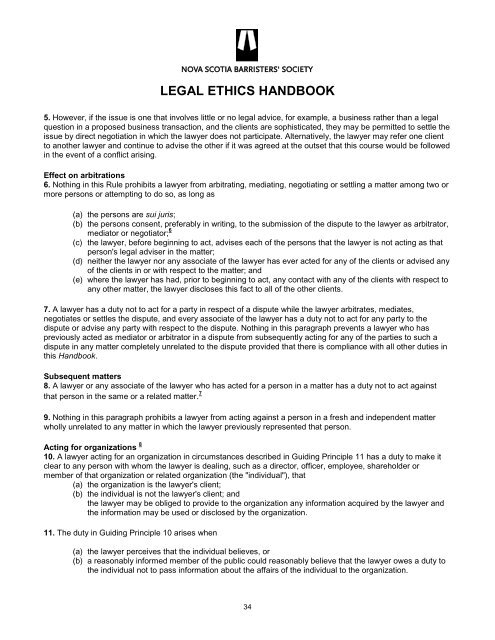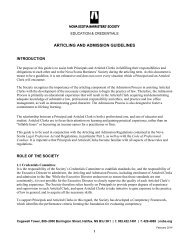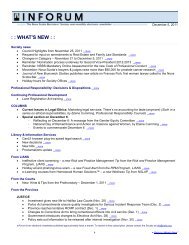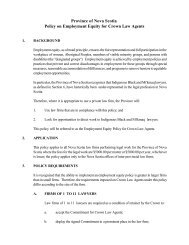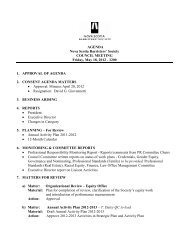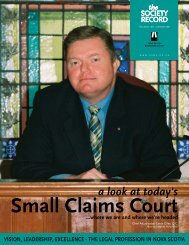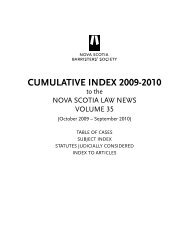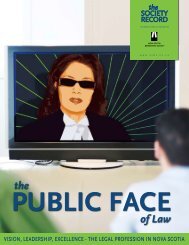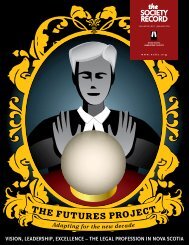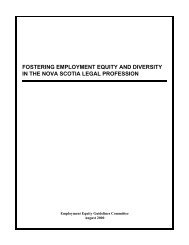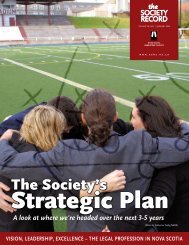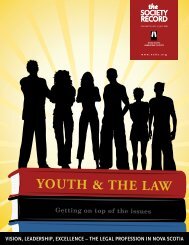legal ethics handbook - Nova Scotia Barristers' Society
legal ethics handbook - Nova Scotia Barristers' Society
legal ethics handbook - Nova Scotia Barristers' Society
You also want an ePaper? Increase the reach of your titles
YUMPU automatically turns print PDFs into web optimized ePapers that Google loves.
LEGAL ETHICS HANDBOOK<br />
5. However, if the issue is one that involves little or no <strong>legal</strong> advice, for example, a business rather than a <strong>legal</strong><br />
question in a proposed business transaction, and the clients are sophisticated, they may be permitted to settle the<br />
issue by direct negotiation in which the lawyer does not participate. Alternatively, the lawyer may refer one client<br />
to another lawyer and continue to advise the other if it was agreed at the outset that this course would be followed<br />
in the event of a conflict arising.<br />
Effect on arbitrations<br />
6. Nothing in this Rule prohibits a lawyer from arbitrating, mediating, negotiating or settling a matter among two or<br />
more persons or attempting to do so, as long as<br />
(a) the persons are sui juris;<br />
(b) the persons consent, preferably in writing, to the submission of the dispute to the lawyer as arbitrator,<br />
mediator or negotiator; 6<br />
(c) the lawyer, before beginning to act, advises each of the persons that the lawyer is not acting as that<br />
person's <strong>legal</strong> adviser in the matter;<br />
(d) neither the lawyer nor any associate of the lawyer has ever acted for any of the clients or advised any<br />
of the clients in or with respect to the matter; and<br />
(e) where the lawyer has had, prior to beginning to act, any contact with any of the clients with respect to<br />
any other matter, the lawyer discloses this fact to all of the other clients.<br />
7. A lawyer has a duty not to act for a party in respect of a dispute while the lawyer arbitrates, mediates,<br />
negotiates or settles the dispute, and every associate of the lawyer has a duty not to act for any party to the<br />
dispute or advise any party with respect to the dispute. Nothing in this paragraph prevents a lawyer who has<br />
previously acted as mediator or arbitrator in a dispute from subsequently acting for any of the parties to such a<br />
dispute in any matter completely unrelated to the dispute provided that there is compliance with all other duties in<br />
this Handbook.<br />
Subsequent matters<br />
8. A lawyer or any associate of the lawyer who has acted for a person in a matter has a duty not to act against<br />
that person in the same or a related matter. 7<br />
9. Nothing in this paragraph prohibits a lawyer from acting against a person in a fresh and independent matter<br />
wholly unrelated to any matter in which the lawyer previously represented that person.<br />
Acting for organizations 8<br />
10. A lawyer acting for an organization in circumstances described in Guiding Principle 11 has a duty to make it<br />
clear to any person with whom the lawyer is dealing, such as a director, officer, employee, shareholder or<br />
member of that organization or related organization (the "individual"), that<br />
(a) the organization is the lawyer's client;<br />
(b) the individual is not the lawyer's client; and<br />
the lawyer may be obliged to provide to the organization any information acquired by the lawyer and<br />
the information may be used or disclosed by the organization.<br />
11. The duty in Guiding Principle 10 arises when<br />
(a) the lawyer perceives that the individual believes, or<br />
(b) a reasonably informed member of the public could reasonably believe that the lawyer owes a duty to<br />
the individual not to pass information about the affairs of the individual to the organization.<br />
34


